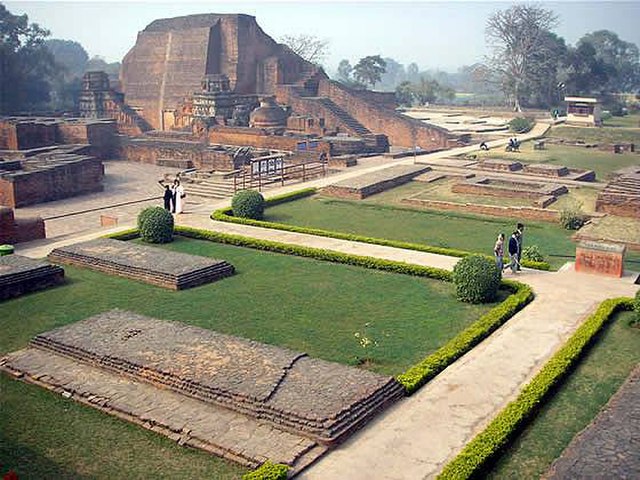Yogachara is an influential tradition of Buddhist philosophy and psychology emphasizing the study of cognition, perception, and consciousness through the interior lens of meditation, as well as philosophical reasoning (hetuvidyā). Yogachara was one of the two most influential traditions of Mahayana Buddhism in India, along with Madhyamaka.
Maitreya meditating, 2nd century CE, Loriyan Tangai, Indian Museum, Kolkata
The bodhisattva Maitreya and disciples, a central figure in Yogacara origin myth. Gandhara, 3rd century CE.
Panorama of the site of Vikramaśīla university (Bhagalpur district, Bihar). Vikramaśīla was an important center for late Indian Yogacara scholars, including the great panditas like Jñānaśrīmitra and Ratnākaraśānti.
Statue of a traveling Xuanzang at Longmen Grottoes, Luoyang
Buddhist philosophy is the ancient Indian philosophical system that developed within the religio-philosophical tradition of Buddhism. It comprises all the philosophical investigations and systems of rational inquiry that developed among various schools of Buddhism in ancient India following the parinirvāṇa of Gautama Buddha, as well as the further developments which followed the spread of Buddhism throughout Asia.
The Buddhist Nalanda mahavihara was a major institution of higher-learning in ancient India from the 5th century CE until the 12th century.
Gautama Buddha surrounded by his followers. Illustration from an 18th-century Burmese watercolour, Bodleian Library.
Indian Emperor Aśoka and the elder Moggaliputta-Tissa, who is seen as a key thinker of the Vibhajyavāda tradition (and thus, of Theravada).
Buddhaghosa (c. 5th century), the most important Abhidharma scholar of Theravāda Buddhism, presenting three copies of the Visuddhimagga.








